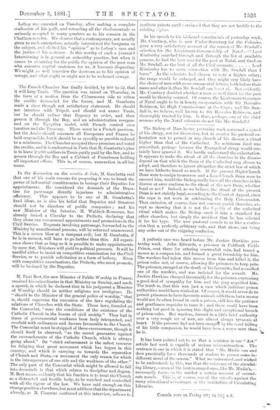M. Paul Bert, the new Minister of Public Worship in
France, -received his subordinates in that Ministry on Sunday, and made a speech, in which he declared that in his judgment a Minister of Worship should be neither religious nor irreligious. He " should be the Minister of the general police of worship," that is, should supervise the execution of the laws regulating the relations of Churches with the State. Those laws, founded on the Concordat, "were the conditions of the existence of the • Catholic Church in the bosom of civil society." They had in times of governmental weakness been laxly interpreted, and overlaid with ordinances and decrees favourable to the Church. The Concordat must be stripped of these excrescences, though it should itself be observed, "as the surest guarantee against the encroachments of the Catholic Church, which is always going ahead." Its "strict enforcement is the safest resource for delaying that great movement which has begun in this country, and which is carrying us towards the separation of Church and State,—a movement the only reason for which is the intemperance of one side and the weakness of the other." 'The only part of the Concordat which might be allowed to fall into desuetude is that which relates to discipline and dogma. M. Bert means evidently that his function is to treat the Church as a distrusted and hostile body, to be watched and controlled with all the rigour of the law. We have said enough on this strange position elsewhere, but must add here that the department already, as M. Flourens confessed at this interview, refuses to
institute priests until convinced that they are not hostile to the existing it-viine.






































 Previous page
Previous page